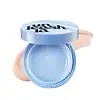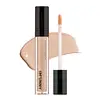What's inside
What's inside
 Key Ingredients
Key Ingredients

No key ingredients
 Benefits
Benefits

 Concerns
Concerns

 Ingredients Side-by-side
Ingredients Side-by-side

Water
Skin ConditioningCI 77891
Cosmetic ColorantDimethicone
EmollientCaprylyl Methicone
Skin ConditioningIsododecane
EmollientButylene Glycol
HumectantSilica
AbrasiveHydrogenated Polyisobutene
EmollientLauryl PEG-9 Polydimethylsiloxyethyl Dimethicone
Skin ConditioningTrimethylsiloxysilicate
EmollientNiacinamide
SmoothingPentaerythrityl Tetraethylhexanoate
EmollientPhenyl Trimethicone
Skin Conditioning1,2-Hexanediol
Skin ConditioningDisteardimonium Hectorite
StabilisingCetyl PEG/PPG-10/1 Dimethicone
EmulsifyingMagnesium Sulfate
Polyglyceryl-3 Polydimethylsiloxyethyl Dimethicone
Skin ConditioningSynthetic Fluorphlogopite
Octyldodecanol
EmollientPolyhydroxystearic Acid
EmulsifyingAluminum Hydroxide
EmollientDimethicone/Vinyl Dimethicone Crosspolymer
Skin ConditioningVinyl Dimethicone/Methicone Silsesquioxane Crosspolymer
Stearic Acid
CleansingAlumina
AbrasiveTriethoxycaprylylsilane
Glyceryl Behenate/Eicosadioate
EmollientTribehenin
EmollientLecithin
EmollientPolyglyceryl-4 Isostearate
EmulsifyingEthylhexyl Palmitate
EmollientIsopropyl Myristate
EmollientIsostearic Acid
CleansingAdenosine
Skin ConditioningTrisodium Ethylenediamine Disuccinate
Polyglyceryl-3 Polyricinoleate
EmulsifyingIsopropyl Titanium Triisostearate
EmollientNeopentyl Glycol Diethylhexanoate
EmollientTocopherol
AntioxidantPentaerythrityl Tetra-Di-T-Butyl Hydroxyhydrocinnamate
AntioxidantCetearyl Alcohol
EmollientCI 77492
Cosmetic ColorantCI 77491
Cosmetic ColorantCI 77499
Cosmetic ColorantWater, CI 77891, Dimethicone, Caprylyl Methicone, Isododecane, Butylene Glycol, Silica, Hydrogenated Polyisobutene, Lauryl PEG-9 Polydimethylsiloxyethyl Dimethicone, Trimethylsiloxysilicate, Niacinamide, Pentaerythrityl Tetraethylhexanoate, Phenyl Trimethicone, 1,2-Hexanediol, Disteardimonium Hectorite, Cetyl PEG/PPG-10/1 Dimethicone, Magnesium Sulfate, Polyglyceryl-3 Polydimethylsiloxyethyl Dimethicone, Synthetic Fluorphlogopite, Octyldodecanol, Polyhydroxystearic Acid, Aluminum Hydroxide, Dimethicone/Vinyl Dimethicone Crosspolymer, Vinyl Dimethicone/Methicone Silsesquioxane Crosspolymer, Stearic Acid, Alumina, Triethoxycaprylylsilane, Glyceryl Behenate/Eicosadioate, Tribehenin, Lecithin, Polyglyceryl-4 Isostearate, Ethylhexyl Palmitate, Isopropyl Myristate, Isostearic Acid, Adenosine, Trisodium Ethylenediamine Disuccinate, Polyglyceryl-3 Polyricinoleate, Isopropyl Titanium Triisostearate, Neopentyl Glycol Diethylhexanoate, Tocopherol, Pentaerythrityl Tetra-Di-T-Butyl Hydroxyhydrocinnamate, Cetearyl Alcohol, CI 77492, CI 77491, CI 77499
Water
Skin ConditioningTitanium Dioxide
Cosmetic ColorantCyclopentasiloxane
EmollientPhenyl Trimethicone
Skin ConditioningButylene Glycol
HumectantCetyl PEG/PPG-10/1 Dimethicone
EmulsifyingCI 77492
Cosmetic ColorantTrimethylsiloxysilicate
EmollientPolymethyl Methacrylate
PEG-10 Dimethicone
Skin ConditioningMica
Cosmetic ColorantDisteardimonium Hectorite
StabilisingVinyl Dimethicone/Methicone Silsesquioxane Crosspolymer
Sodium Chloride
MaskingAluminum Hydroxide
EmollientTriethoxycaprylylsilane
CI 77491
Cosmetic ColorantCI 77499
Cosmetic ColorantPhenoxyethanol
PreservativeMethicone
EmollientSqualane
EmollientWater, Titanium Dioxide, Cyclopentasiloxane, Phenyl Trimethicone, Butylene Glycol, Cetyl PEG/PPG-10/1 Dimethicone, CI 77492, Trimethylsiloxysilicate, Polymethyl Methacrylate, PEG-10 Dimethicone, Mica, Disteardimonium Hectorite, Vinyl Dimethicone/Methicone Silsesquioxane Crosspolymer, Sodium Chloride, Aluminum Hydroxide, Triethoxycaprylylsilane, CI 77491, CI 77499, Phenoxyethanol, Methicone, Squalane
 Reviews
Reviews

Ingredients Explained
These ingredients are found in both products.
Ingredients higher up in an ingredient list are typically present in a larger amount.
Aluminum Hydroxide is a form of aluminum. It can be naturally found in nature as the mineral gibbsite. In cosmetics, Aluminum Hydroxide is used as a colorant, pH adjuster, and absorbent.
As a colorant, Aluminum Hydroxide may add opacity, or reduce the transparency. Aluminum hydroxide is contains both basic and acidic properties.
According to manufacturers, this ingredient is an emollient and humectant. This means it helps hydrate the skin.
In medicine, this ingredient is used to help relieve heartburn and help heal ulcers.
There is currently no credible scientific evidence linking aluminum hydroxide in cosmetics to increased cancer risk.
Major health organizations allow the use of aluminum hydroxide in personal care products and have not flagged it as a carcinogenic risk at typical usage levels.
Learn more about Aluminum HydroxideButylene Glycol (or BG) is used within cosmetic products for a few different reasons:
Overall, Butylene Glycol is a safe and well-rounded ingredient that works well with other ingredients.
Though this ingredient works well with most skin types, some people with sensitive skin may experience a reaction such as allergic rashes, closed comedones, or itchiness.
Learn more about Butylene GlycolThis ingredient is a high molecular weight silicone. It has emulsifying and skin conditioning properties.
Ci 77491 is also hydrated iron III oxide. It's sole purpose is to give a red/pink hue to products.
Iron III oxides are classified as inorganic chemicals for coloring.
Synthetically created Ci 77491 is considered safer than those naturally found. This is because the synthetically created version may contain less impurities. Iron oxides are generally non-toxic and non-allergenic.
Learn more about CI 77491Ci 77492 is also hydrated iron III oxide. It's sole purpose is to give a yellow hue to products.
Iron III oxides are classified as inorganic chemicals for coloring.
Synthetically created Ci 77492 is considered safer than those naturally found. This is because the synthetically created version may contain less impurities. Iron oxides are generally non-toxic and non-allergenic.
Learn more about CI 77492Ci 77499 is also hydrated iron III oxide. It is created from mixing red and black iron oxides. This helps give shades of darkness to a product.
Iron III oxides are classified as inorganic chemicals for coloring.
Disteardimonium Hectorite comes from the clay mineral named hectorite. It is used to add thickness to a product.
It can also help stabilize a product by helping to disperse other ingredients.
Hectorite is a rare, white clay mineral.
Learn more about Disteardimonium HectoritePhenyl Trimethicone is a silicon-based polymer. It is derived from silica.
Phenyl Trimethicone is used as an emollient and prevents products from foaming.
As an emollient, it helps trap moisture in the skin. It is considered an occlusive.
Learn more about Phenyl TrimethiconeTriethoxycaprylylsilane is a silicone used to bind and stabilize ingredients.
As an emulsifier, it helps prevent ingredients from separating. This can help elongate the shelf life of products.
Triethoxycaprylylsilane is often used to coat mineral sunscreens ingredients to help give a better feel. It also helps reduce oxidative stress in sunscreens.
Learn more about TriethoxycaprylylsilaneThis silicone is an emollient. Emollients create a thin film on the skin to prevent moisture from escaping.
It is not soluble in water and helps increase water-resistance in products.
According to a manufacturer, it can blend seamlessly with silicone oils, such as Cyclopentasiloxane.
Learn more about TrimethylsiloxysilicateThis ingredient is used in makeup and skincare to thicken formulas, reduce shine, and give skin a silky-smooth feel.
It’s a white silicone powder that sits in fine lines and pores to blur their appearance though its effectiveness depends on the particle size.
You'll typically find this ingredient in amounts between 0.1-20%.
Learn more about Vinyl Dimethicone/Methicone Silsesquioxane CrosspolymerWater. It's the most common cosmetic ingredient of all. You'll usually see it at the top of ingredient lists, meaning that it makes up the largest part of the product.
So why is it so popular? Water most often acts as a solvent - this means that it helps dissolve other ingredients into the formulation.
You'll also recognize water as that liquid we all need to stay alive. If you see this, drink a glass of water. Stay hydrated!
Learn more about Water